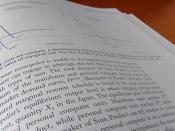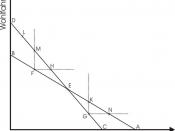Introduction
On August 7th 1994, 11 miners were killed when an explosion ripped through the BHP-owned Number 2 Mine in Moura, Central Queensland . In a bitter attack the Workers News declared that 'these deaths were not an unexpected accident, but a direct result of BHP's drive to boost productivity and cut costs. They form part of the disastrous death toll now escalating through industry' .
This paper seeks to determine what role the law relating to damages for personal injury and death plays in allowing commercial interests to consider life and health as an exploitable resource in the pursuit of profits. The argument will be presented that the law is not neutral between commercial and personal interests, but is in fact indefensibly favourable to the commercial interests of profit, over the personal interests of life, health and happiness.
Regrettably, it is often the case that arguments such as the one presented in this paper usually break down into two isolated schools of thought, economics and sociology, with each discipline ignoring the insights of the other.
Economists, although bitterly divided, share at least some paradigmatic assumptions with other economists, and the same is true of sociologists. Yet as a result of what Edward de Bono termed the 'arrogance of logic' , each discipline sets up logically impeccable arguments that are derived from within a particular framework of perception and are literally incapable of being challenged from any external framework of perception. This paper will attempt to provide a critique of the law of remedies that will transcend the particularity of specific disciplines by arguing that damages for personal injury and death are indefensibly favourable to commercial interests, both from an economic point of view and a sociological point of view. Although the economic argument will initially be presented separately from...



e-commerce
An e-commerce consultant is someone who knows the components needed to help a business create and maintain a web-based storefront. Network is the person who ultimately is responsible for the installation, maintenance, and everyday operation of a network. E-commerce has now become a key component of many organizations in
the daily running of their business. Electronic commerce is a system of online shopping and information retrieval accessed through networks of personal computers. As the Internet, and in turn E-commerce has developed, and continues to grow, it is very important that any organization, in any particular industry, must base it's strategic planning around such a rapidly growing medium. The growth of the Internet is an environmental influence that must be embraced and understood so to successfully plan for future marketing. In order to successful realize the impact that E-commerce has in terms of marketing, it is important to break the area of interest into some key areas.
1 out of 1 people found this comment useful.